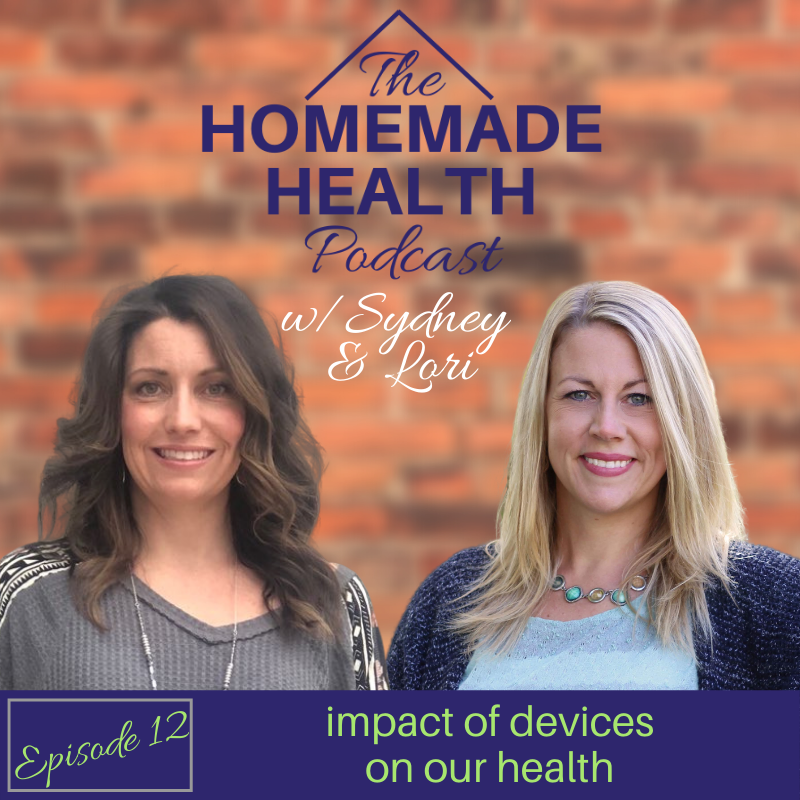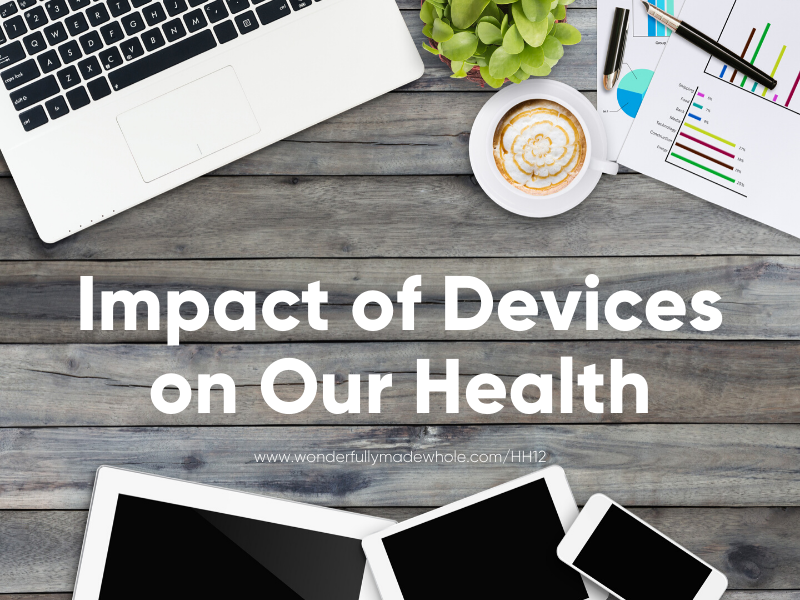Episode 11 of The Homemade Health Podcast – Impact of Devices on Our Health
Join Sydney & Lori as they dive into the topic of devices. They discuss how devices and social media are designed to be addictive and keep you on them longer. Learn how devices are impact on our health in serious ways and strategies that you can implement to effectively manage the use of devices in your own life.

Today’s Topic: Exploring How Devices Are Impacting Us
SOME WAYS DEVICES ARE IMPACTING OUR HEALTH
-
- ELECTROMAGNETIC RADIATION
- Cancer risks
- Disruption of sleep
- DISRUPTING SLEEP
- EMFs
- Blue lights
- Can disrupt sleep even in middle of night if it lights up
- Addiction
- Anxiety
- WEIGHT GAIN
- Disrupted sleep
- Laziness
- Physically & mentally
- EYESIGHT
- Temporary one-eyed blindness has even been seen!
- POSTURAL ISSUES
- Abnormal curves in spine
- Headaches and other issues
- Back and neck pain
- Texting thumb
- Cell phone elbow
- Abnormal curves in spine
- ACCIDENTS
- Car accidents
- People getting hit by cars
- BRAIN CHANGES
- Changes in brain structure
- smaller grey matter density in the anterior cingulate cortex portion of their brain, which is linked to decreased cognitive control and socio-emotional regulation.
- ELECTROMAGNETIC RADIATION
-
-
- Changes how we think
-
- Researchers from Dartmouth compared the takeaways people who read physical books got from a passage against those of people who read on screens, and they found that people who do their reading on a screen weren’t as good at recognizing abstract concepts in the passages they read.
-
- Shortened attention spans/decreased productivity
- Digital multi-tasking
- A study from Microsoft showed that the average attention span of participants was only eight seconds. A goldfish has an attention span of nine seconds. This shortened attention span is a new development, and it’s more pronounced in people who are “heavy multi-screeners.” In the year 2000, before the advent of smartphones, humans could pay attention to something for 12 seconds.
- Shortened attention spans/decreased productivity
- DISCONNECT FROM REAL LIFE
- (UN)Social Media
- People less assertive in real life
- Decrease in empathy
- Couple in S Korea so obsessed with raising two “virtual children” online that they let their actual three month old daughter starve to death
- ANXIETY
- (UN)SOCIAL MEDIA
- Leading us to not be social in real life
- Bullying
- Fear of missing out
- Conditioned to be constantly available and connected
- Feel the need to immediately respond to every text, notification, etc.
- Anxiety over misplacing it
- Cognitive performance tests done w/ and w/o phone in room
- (UN)SOCIAL MEDIA
- ADDICTIVE
- Smartphone withdrawal can cause physical symptoms like anxiety, insomnia, and depression.
- Smartphones & social media act on the dopamine pathway, just like slot machines, cocaine and other drugs do
- Dopamine = pleasure neurotransmitter
- Works to motivate behavior, reward driven
- Get a rush when we take a bite of good food (esp sugar), have sex, meet a deadline and have successful social interactions
- Activates different pathways – learning behavior that makes us feel good
- Social stimuli could be a laughing face, making someone happy, recognition by your peers – or it could be a “like”, a notification or comment on social media, or a text from someone
- Variable reward schedules & social media algorithms – referenced Harvard article
- Dopamine = pleasure neurotransmitter
- Touches are addictive too – average person touches smartphone 2,600 times per day
WAYS TO COMBAT TECH ADDICTION & UNPLUG
- Set an out of office message
- Try an app like Moment or BreakFree that tracks all the time you are wasting on your phone, can be a wake up call
- Detox with a social media “fast”
- Keep your phone out of the room or at least out of arms reach in the bedroom
- on airplane mode
- Set times when you go device free
- Some people find success with contracts
- A certain time each day when they go away
- Meal times
- Commit to being present and living in the moment
- If you are with real people, engage in conversation and don’t pull your phone out
- Think about if really need a photo or video, because that often causes us to not fully enjoy what we are experiencing
- How to put an away message on text messages:
- On an iphone:
- Go to “settings”
- Scroll down to “Do Not Disturb”
- Tap on “Auto-Reply”
- Fill out the away message that you want.
- Lori goes with “I’m limiting my time on devices so my phone is on Do Not Disturb. I’ll get back to you later when I’ve seen your message.”
- On an iphone:
LIFE WITHOUT A DEVICE
- People forget what life is like without their device!
- Kids need direction and can’t just “go play”
- Here are some things that you can do off your devices:
- Play a game
- Read a book
- Go for a walk
- Exercise
- Meditate or pray
- journal
- Listen to music
- Do a puzzle
- Color or draw
- Do a craft
- Reorganize
- Cook or bake for fun
- Have a conversation!
Have you struggled with addiction to a screen or device? Do you have any systems in place to ensure that you aren’t spending too much time on your devices? We’d love to hear about your experience! Comment below, email us at homemadehealthpodcast@gmail.com or let us know on Instagram @HomemadeHealthPodcast.

